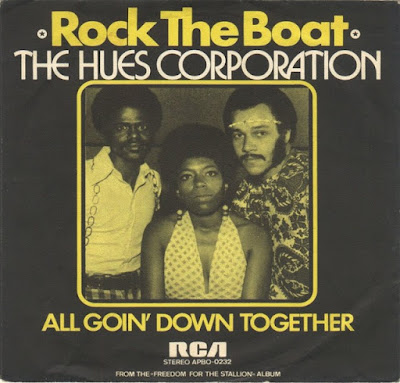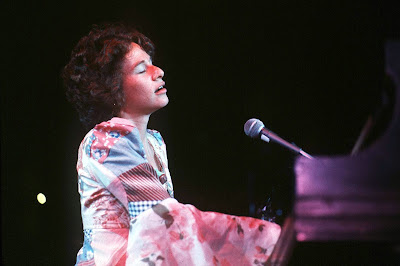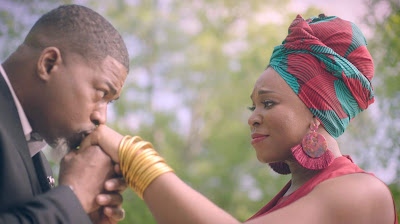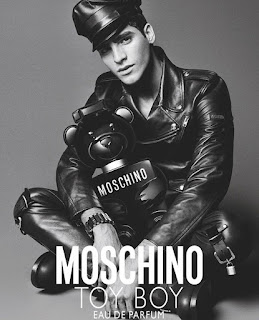According to one of our musical sources:
“The Hues Corporation – “Rock The Boat”
HIT #1: July 6, 1974
STAYED AT #1: 1 week
Disco was an up-from-underground movement as pure and revolutionary and all-encompassing as any of the other sea changes in the history of American popular music. Just like punk or rap or grunge — or like rock ‘n’ roll itself, really — disco is the story of a sound that took root, unnoticed, in a few small venues before going on to conquer the popular imagination. Because disco was built on lush, slick, cinematic sounds, it’s tempting to think of it as a top-down wave, an example of record labels dictating tastes to the American masses. But that’s not what it was. It was a tiny and insular scene — a few gay clubs in New York, and a few DJs who were on the hunt for the sounds that could move the crowds at those clubs. Nobody was making music for those crowds. The DJs had to go out and find it. The Hues Corporation’s “Rock The Boat” easily could’ve disappeared into history, a forgotten deep cut from a forgotten album, if those DJs hadn’t found it.
“Rock The Boat” was an accidental disco hit, but it was absolutely a disco hit. It’s got the disco beat, a steady four-on-the-floor thump that served as the heartbeat of that tiny New York scene. It’s got the fripperies, the horns and bongos and pianos and guitar-wails. It’s got the big, cheesy, dramatic chorus. The people who made “Rock The Boat” didn’t realize they were making a disco song. “Rock The Boat” has that beat because arranger Tom Sellers was trying to recreate a sound he’d heard while on vacation in the Caribbean. But they ended up with a disco song anyway.
The Hues Corporation started in Los Angeles in 1969. The songwriter Wally Hughes assembled the group as a vehicle for his own songs. He was hoping to put together a friendly and welcoming black soul-pop group who, ideally, could make a bunch of money as a Las Vegas nightclub act — something like late-’60s hitmakers Friends Of Distinction. The Hues Corporation was his second attempt at it after a group called Brothers And Sisters fell apart. (St. Clair Lee, a member of both Brothers And Sisters and the Hues Corporation, was Hughes’ surfing buddy.) Hughes named the new group the Hues Corporation, and it’s one of the all-time godawful puns in pop-music history. It’s a pun so band you probably didn’t realize it was a pun. (It’s like Howard Hughes’ old company, but with “hues” — as in, colors — in place of “Hughes.”)
The Hues Corporation signed to RCA after landing a few songs on the soundtrack of the culty 1972 blaxploitation movie Blacula. (Gene Page, another friend of Hughes, did the Blacula score, so that’s how they got that gig.) “Rock The Boat,” which Hughes wrote in 15 minutes, was originally an album track on Freedom For The Stallion, the excellently titled LP that the Hues Corporation released in 1973. It’s a gloriously dumb song, a song-length metaphor about a relationship as an ocean voyage: “Our love is like a ship on the ocean / We’ve been sailing with a cargo full of love and devotion.”
Everyone involved in “Rock The Boat” was shocked to learn it had caught on in these New York gay-club circles. It had, in fact, been a huge hit in New York clubs for months before the rest of the country caught on. So RCA responded by remixing the song, cranking the bass and drums up higher, and by putting the new version on a second Hues Corporation album. It worked. “Rock The Boat” went nationwide, powered by the energy of this underground New York scene.
It’s not that hard to hear why “Rock The Boat” was such a breath of fresh air. Most of the pop music of the early ’70s was safe and sleepy, if not appallingly hackneyed. ’60s psychedelia had died out, giving way to canned adult-contempo pop. But there’d also been this wave of lush, richly orchestrated soul songs, some of which pushed the beat. People were ready for a new sound, and “Rock The Boat” heralded the arrival of that sound. The song itself is a sprightly groove with some well-timed horn-stabs and a few pleasant string-swirls. I like the screamy guitar solo that bubbles up out of nowhere at the end. The song has spirit and energy, and it also has that beat. On its own, it’s fun enough. But it also signals a vast change, a coming of a new thing. It didn’t mean to signal that new thing, but it pushed things along regardless.
GRADE: 7/10
BONUS BEATS: Here’s the scene from Brian De Palma’s great 1993 movie Carlito’s Way where a perfectly horny and ridiculous Sean Penn dances to “Rock The Boat”:
BONUS BONUS BEATS: Here’s Yo La Tengo’s extremely short deadpan version of “Rock The Boat,” from the 2006 covers collection Yo La Tengo Is Murdering The Classics:” – Stereogum.com


















